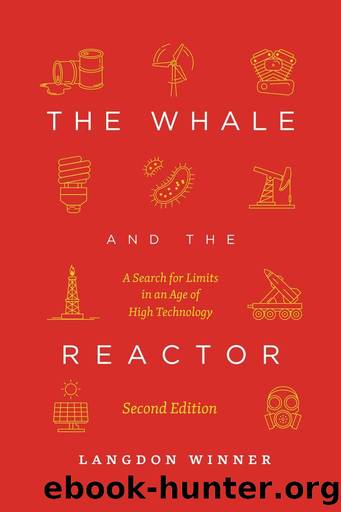The Whale and the Reactor by Langdon Winner

Author:Langdon Winner [Winner, Langdon]
Language: eng
Format: epub
ISBN: 978-0226692548
Publisher: University of Chicago Press
Published: 2020-03-20T07:00:00+00:00
III
EXCESS AND LIMIT
7
THE STATE OF NATURE REVISITED
SEEKINGA RELIABLE WAY to judge the works and accomplishments of civilization, each generation finds an obvious point of reference. Nature provides a vivid contrast to human artifice, a source of powerful insights and arguments. Many political theories begin on exactly this note, asserting as an explicit or implicit first premise: this is the natural way; here is the path nature itself sets before us. In the same vein many criticisms of human institutions, including criticisms of technological society, rest on the charge: what we are doing is horribly contrary to nature; we must repair our ways or stand condemned by the most severe of tribunals. Ralph Waldo Emersonâs classic essay âNatureâ depicts the situation clearly in the context of a man walking into a forest. âThe knapsack of custom falls off his back with the first step he takes into these precincts. Here is sanctity which shames our religions, and reality which discredits our heroes. Here we find Nature to be the circumstance which dwarfs every other circumstance, and judges like a god all men that come to her.â1
Ideas of this kind become more interesting and problematic when expressed as organized doctrine. No artist, no thinker, no political movement, no society has ever rested content with the simple definition of nature as âthe totality of all things.â From the vast array of natural phenomena, people inevitably select particular features for emphasis, endowing them with great esthetic, moral, and political significance. Anyone who examines the range of meanings that have been attributed to ânatureâ in Western history must be impressed by their number, diversity, and glaring contradictory implications. For some nature brings conflict, for others harmony; for some it exists as the very essence of reason and order, for others it looms as throbbing irrational passion; for some it is a source of warmth, nourishment, and solace, for others it is a set of awesome, threatening forces. In different historical periods the same symbols of nature carry different, sometimes opposite meanings.2 Thus, the âwildernessâ feared as a haunt of demons by medieval Christians has commonly been regarded as a place of beauty and inspiration in the eyes of industrial society.
To invoke ânatureâ or âthe naturalâ in discussions about social life is in effect asserting: âThis is real. This is trustworthy. I am not making it up.â Because natural phenomena existed before human intervention, they have a certain reliability, unlike human artifacts and institutions that are all too often filled with deceit. On those grounds the bastard Edmund in King Lear appeals to nature to justify his claims, renouncing those civilized conventions that label him âillegitimate.â
Thou, Nature art my goddess, to thy law
My services are bound. Wherefore should I
Stand in the plague of custom, and permit
The curiosity of nations to deprive me . . .
Shakespeareâs play offers the spectacle of political society and its categories dissolving when confronted by uncontrolled natural forces. It was this very solvent that philosophers of the seventeenth and eighteenth centuries employed to discredit existing authority and to prepare the way for the establishment of new regimes.
Download
This site does not store any files on its server. We only index and link to content provided by other sites. Please contact the content providers to delete copyright contents if any and email us, we'll remove relevant links or contents immediately.
| Automotive | Engineering |
| Transportation |
Whiskies Galore by Ian Buxton(40334)
Introduction to Aircraft Design (Cambridge Aerospace Series) by John P. Fielding(32338)
Small Unmanned Fixed-wing Aircraft Design by Andrew J. Keane Andras Sobester James P. Scanlan & András Sóbester & James P. Scanlan(32141)
Craft Beer for the Homebrewer by Michael Agnew(17447)
Turbulence by E. J. Noyes(7041)
The Complete Stick Figure Physics Tutorials by Allen Sarah(6639)
Kaplan MCAT General Chemistry Review by Kaplan(6054)
The Thirst by Nesbo Jo(5786)
Bad Blood by John Carreyrou(5770)
Learning SQL by Alan Beaulieu(5412)
Weapons of Math Destruction by Cathy O'Neil(5038)
Man-made Catastrophes and Risk Information Concealment by Dmitry Chernov & Didier Sornette(4738)
iGen by Jean M. Twenge(4702)
Digital Minimalism by Cal Newport;(4545)
Life 3.0: Being Human in the Age of Artificial Intelligence by Tegmark Max(4509)
Audition by Ryu Murakami(4099)
1,001 ASVAB Practice Questions For Dummies by Powers Rod(4040)
Electronic Devices & Circuits by Jacob Millman & Christos C. Halkias(4029)
Pale Blue Dot by Carl Sagan(4003)
